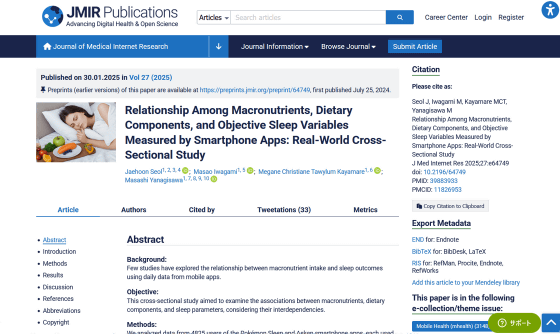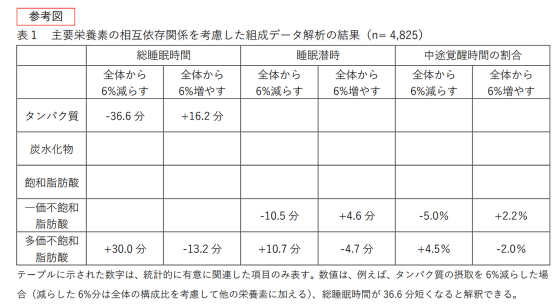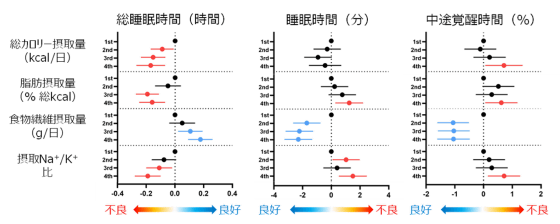Japanese study using 'Asuken' and 'Pokemon Sleep' reveals diet that promotes better sleep

Previous research has shown that sleep and diet are closely related, with
Journal of Medical Internet Research - Relationship Among Macronutrients, Dietary Components, and Objective Sleep Variables Measured by Smartphone Apps: Real-World Cross-Sectional Study
https://www.jmir.org/2025/1/e64749

Large-scale study on the relationship between sleep and nutrition using app data | Medical & Health - TSUKUBA JOURNAL
https://www.tsukuba.ac.jp/journal/medicine-health/20250203140000.html
Large-scale study on the relationship between sleep and nutrition using app data.pdf
(PDF file) https://www.tsukuba.ac.jp/journal/pdf/p20250203140000.pdf
High-Protein And Fiber Diet Linked to Longer, Better Sleep, Study Finds : ScienceAlert
https://www.sciencealert.com/high-protein-and-fiber-diet-linked-to-longer-better-sleep-study-finds
To investigate the relationship between people's diet and sleep, the research team analyzed data collected from 4,825 subjects who simultaneously used the food management app ' Asuken ' and the sleep game app ' Pokemon Sleep . The average age of the subjects was 36.7 years old, and 81.6% of the total were women.
The data used in the study included 14 nutrients quantified from daily meals recorded using 'Asuken,' as well as total sleep time, the time from lights out or getting into bed to falling asleep ( sleep latency ), and time waking up during the night recorded using 'Pokemon Sleep.'

Using these data to investigate the relationship between the intake of each nutrient and sleep, it was found that the higher the total calorie intake, the shorter the total sleep time and the longer the time spent waking up during the night. It was also confirmed that people who ate a lot of protein had longer total sleep time than those who ate less, and that people who ate a lot of dietary fiber had longer total sleep time and shorter sleep latency and time spent waking up during the night.
The table below shows the interdependence of major nutrients and sleep variables. A 6% increase in total protein intake increases sleep time by 16.2 minutes, while a 6% decrease reduces sleep time by 36.6 minutes. People with higher intakes of

In addition, the graph below shows the relationship between 'total sleep time,' 'sleep time (presumably a misprint of sleep latency),' and 'wake-up time' based on the 1st group, after classifying subjects into 1st, 2nd, 3rd, and 4th groups in order of 'total calorie intake,' 'fat intake,' 'dietary fiber intake,' and 'ingested Na+/Ka+ ratio (ratio of sodium to potassium ingested).' It can be seen that the higher the total calorie intake, the shorter the total sleep time, the higher the dietary fiber intake, the longer the total sleep time, and the higher the dietary fiber intake, the shorter the sleep latency.

The researchers believe the link between diet and sleep is likely due to multiple factors: For example, previous research has suggested that eating more protein may stimulate the production of melatonin and serotonin in the brain, which may help regulate sleep.
The production of these hormones may also be promoted by the effect of dietary fiber intake on gut bacteria. 'Recent studies have suggested that changes in the gut microbiota may affect sleep and nutrient absorption,' the research team said.
However, it should be noted that this study only used self-reported data and does not show a direct causal relationship. Also, people who use apps such as 'Asuken' and 'Pokemon Sleep' are more likely to be interested in health in general, which may have influenced the results.
The research team stated, 'This study suggests that a diet rich in protein, polyunsaturated fatty acids, and dietary fiber may improve sleep. In the future, we plan to verify the effects of actual dietary interventions and investigate causal relationships in more detail.'
Related Posts:







